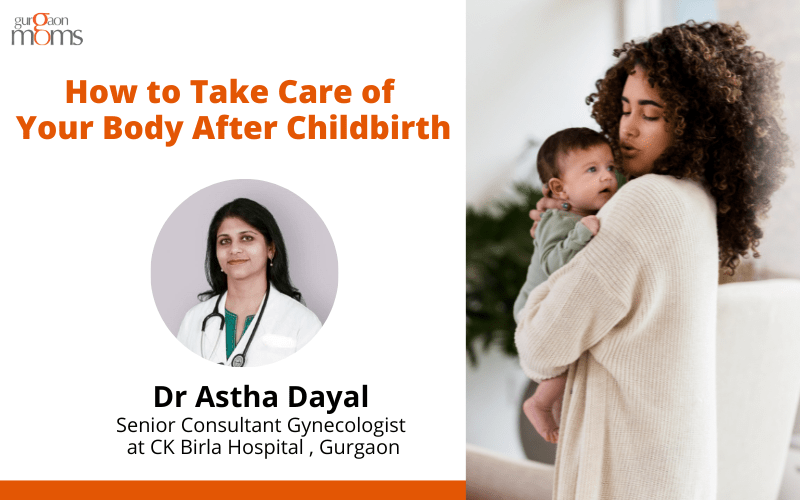As they say, the moment a child is born, the mother is also born. Becoming a mother is an incredible, life altering experience, but it could be exhausting and overwhelming. While focusing on the baby, it is extremely important not to ignore your own health and well being.
1. Adequate Rest- Traditionally, new mothers were asked to be in bed, cover their head, stay indoors for 6 weeks. This is important to some extent as your body is recovering from the physical changes- the exhaustion of labour, the pain of stitches, the
bleeding, sore breasts and low immunity. Medically, we don’t recommend absolute bed rest, but it is important to go slow, listen to your body,and resume basic daily activities only as you feel ready. Try to sleep when your baby sleeps. Limit visitors
and try making a routine around your baby. Also, don’t have unrealistic expectations from yourself and learn to delegate work to family members or household helps. So, the simple mantra is-Don’t shy from asking for help and don’t strive towards perfection.
2. Diet-Women need 550 extra calories in breastfeeding, which is about double of that required in pregnancy. Breastfeeding mothers need extra calcium, iron, protein, minerals and vitamins. Contrary to popular beliefs, where women are not allowed solid food or milk for weeks, it is actually important to increase dairy and protein for faster recovery. Drink 8 large glasses of liquids like water and milk to improve the quantity and quality of breast milk and avoid constipation. Avoid too much fat,
caffeine or sweets in your diet, avoid too much ghee, panjiri and ladoos as are commonly given to lactating mothers.
3. Exercise-This helps in strengthening the body, helps in weight loss and acts as a mood elevator. It helps reduce backache, constipation and bloating, improves posture and leads to better sleep. Exercise can be started within a week of an uncomplicated
delivery or caesarean but should be supervised and gradually increased. Women can start walks, stretches, breathing, upper body and back strengthening exercises. Kegels exercise is the most effective within the first 6 weeks of delivery. If done consistently, it prevents urinary leak or prolapse in old age. Avoid heavy weight lifting, abdominal crunches, or exercises that put pressure on the abdomen for 3-6 months after a caesarean to prevent the risk of hernia formation.
4. Personal hygiene-It is very important to keep your body clean- have a bath daily, brush your teeth, keep nails trimmed, wash hands before food and after changing diapers, keep the stitches clean, and change pads frequently.
5. Health Supplements-After childbirth, women need iron, folic acid and vitamin B12 supplements to replenish the blood loss of delivery. Breastfeeding mothers need 1000mg calcium daily and Vitamin D3 to protect their bones and joints. Multivitamin tablets containing biotin help recover the hair loss after delivery. Our daily diet may not be enough and added supplements are mostly needed to prevent bone and joint pains and anaemia.
6. Mood-Many physical, emotional and behavioural changes happen after childbirth which could make one feel sad, tearful, depressed, or anxious. Self doubt, body image issues, physical discomfort make one emotionally labile. To add to this, our traditional customs, rituals, restrictions, instructions from family/elders also contribute to the distress of the vulnerable mother. The first step is to know that this is normal, and will last only a few weeks. Secondly, it’s important to communicate your feelings to your dear ones and your doctor without feeling embarrassed or guilty. Joining a postpartum support group, yoga, meditation, affirmations and taking out time for self care will help you this time. However, if the sadness is lasting more than 2 weeks, or
you get feelings of self harm, or harming the baby, you must visit your doctor and rule out postpartum depression.
7. Breastfeeding– Breastfeeding is the most natural and healthy way of nourishing your baby. We recommend exclusive breastfeeding for 6 months. It can be challenging initially but don’t let this overwhelm or depress you. Try learning breastfeeding
positions, latching, and how to manage issues like cracks, soreness, inadequate milk while at the hospital by your gynaecologist or lactation consultant. It takes a few weeks for the mother and baby to adjust to each other, so be patient. Always try the breast before giving formula feed or expressed breast milk. Regular suckling helps in bonding and maintains a regular milk supply. If the breast is red, tender or hard, treat it early with breast massage, hot and cold packs, pumping, and wearing a supportive bra. If these measures don’t help, then visit your doctor early to rule out a breast abscess.
8. Weight loss-Just after delivery, most women shed about 4-5kg weight. But you shouldn’t expect the remaining weight to go away so easily. Gradual weight loss over several months is best, especially for a breastfeeding mother, so that the milk supply is not affected. Healthy eating and regular exercise is usually all that you need. Just avoid the extra sugary, fatty foods and alcohol. You should discuss any diet plans or calorie restriction with your doctor, especially if you are exclusively breastfeeding.
9. Skin and hair care– Stretch marks, acne, pigmentation or sensitivity of the skin are common after delivery. Stretch mark care and prevention should start from mid pregnancy by regularly applying moisturising creams. Stretch marks once formed lighten with time, and change colour from pink to white, but may not totally vanish. For the face, use a fragrance free moisturiser and wear sunscreen even when indoors. Washing your face regularly, keeping yourself hydrated and adequate rest help control the acne. Darkening of the skin folds and the tummy may return to normal once your hormones stabilize. If the pigmentation never returns to its pre delivery colour there are options like laser treatments, surgery, and certain whitening creams.Postpartum hair loss is a temporary condition where the hormonal changes after delivery make the hair go into resting phase and then shed all together at once. Being patient, eating a healthy diet rich in protein, fruits and vegetables, being gentle with your hair and using a mild sulphate free shampoo will help in this time.
10. Bleeding-Heavy bleeding after delivery should not last more than a few days.This is followed by lochia, or discharge which appears bloody for 3 or 4 days. Then it becomes pale brown, and after about 2 weeks, it becomes yellowish white. The
discharge may continue for up to about 6 weeks after delivery. Using a pad for so long can cause rashes, so one can switch to panty liners, and apply rash creams like those used for the baby. Avoid using tampons till the episiotomy stitches heal. Contact
your doctor if the bleeding is becoming heavier or not stopping in 2 months.
11. Sexual activity-We usually advise abstinence for 6 weeks after delivery till your stitches heal and discharge stops. Lactating women sometimes feel pain or dryness when they resume intercourse, and may need some lubricant jelly initially. You must
also discuss contraception with your doctor at the 6 week visit. Although breastfeeding reduces your chances of conception, it cannot be a totally reliable method of birth control. Many women don’t get periods while breastfeeding but they
can still get pregnant. Barrier protection like condoms, injections or pills safe in breastfeeding can be used. Long acting spacing methods, like IUCD (multiload insertion or MIRENA) can be done after 6 weeks of delivery or 3 months after a
caesarean section. Permanent methods like tubal ligation surgery or vasectomy can also be considered if your family is complete.
12. Vaccination-Routine adult vaccination can be resumed after delivery. A rubella vaccine can be given if you were not vaccinated earlier. Cervical cancer vaccine, chicken pox vaccine, hepatitis B vaccine and regular Flu shots can be taken as
advised by your doctor.
Childbirth transforms a woman, both physically and emotionally. It is important to enjoy this bittersweet journey with patience, strength and resilience, and to prioritize self care without any feeling of guilt.
 This article has been written by Dr Astha Dayal
This article has been written by Dr Astha Dayal
Dr. Astha Dayal is currently practicing as the Lead Consultant Gynaecologist at CK Birla hospital in Gurgaon and has her clinic in DLF phase 1. She is an alumnus of Maulana Azad Medical College and the Royal College, London. Her expertise lies in the medical and surgical management of women’s health problems, managing high-risk pregnancies, infertility, advanced laparoscopy and hysteroscopy, urogynecology and reproductive endocrinology. She conducted the first water birth in Gurgugram.
In her 16 years of experience, she has worked at with Lok Nayak Hospital, Royal College, London, Medanta, the Medicity, and Artemis.
She lives in Gurgaon with her 2 children age 12 and 10. In her free time she loves to paint and travel. She also runs a small classroom for underprivileged kids.






